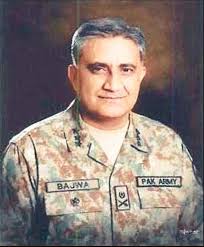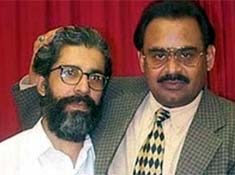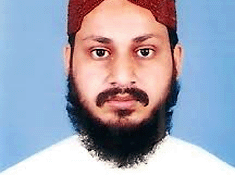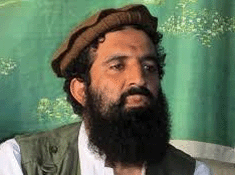Who will be Pakistan’s next Army Chief?

ISLAMABAD: (ASIA TIMES) Amidst heightened civil military tensions and mounting pressure from the opposition parties to come clean in the Panama Papers scam, Prime Minister Nawaz Sharif is all set to name the new Army Chief who will replace General Raheel Shareef on November 27. The choice is difficult to make as the prime minister is looking for a general with zero political ambitions in a country whose military had ceased to be apolitical.
The Pakistan Army is overwhelmingly involved in national politics and often dictates foreign and defense policies to the elected governments. Therefore, the military detractors have coined a dictum: “Most countries have armies, but the Pakistan Army has a country.” In fact, the Army Chief is considered to be the most influential and equally powerful person in Pakistan, being someone whose finger is on the nuclear button. Thus, the question of who will succeed General Raheel Sharif as the 16th chief of Pakistan Army is a cumbersome one with ramifications for the future of South Asia. There were rumors in the past that just like his predecessors, (General Ashfaq Kayani and General Pervez Musharraf) Raheel Shareef would receive an extension in his service. But the Army Chief put all these rumors to rest on January 25, 2016 by officially making it clear through a statement that he would retire upon completion of his three-year term in November.
All eyes are now set on the prime minister who is weighing his options very cautiously, given the fact that both his governments had been sent home prematurely by the Army in the past. While the military circles say the army leadership would expect the prime minister to endorse one of its nominees as the new chief on the basis of seniority, the government circles say the PM is not bound to choose the new COAS from the panel of three names. If history is any indicator, they argue, the prime minister may assert his authority and bring in his own choice for the coveted slot, as he had done in 2013 while appointing General Raheel Shareef who was number three on the seniority list of the generals. It was in fact Raheel’s reputation as a professional soldier with no political ambitions which had played a major factor in his selection as the COAS by Nawaz Sharif. While the government is confident that the outgoing Army chief would keep the armed forces away from politics, there are individuals in the intelligence establishment who want to throw out the prime minister, mainly because they too are on their way out.
Therefore, according to the government circles, these elements are still making frantic efforts to topple the government through unconstitutional means before General Raheel Shareef’s retirement. According to Federal Information Minister Pervez Rasheed, some renegade elements in the establishment have convinced Imran Khan that the Sharif government would be toppled if he marches on Islamabad as per schedule on November 2 and besieges the parliament building. Considered close to the establishment circles, Imran, a former cricketer-turned politician, has announced siege of Islamabad, ramping up pressure on the government to take concrete measures to address the party’s concerns over the Panamagate affair. Imran has declared this would be his final showdown with Nawaz Sharif and members of his family who are named in the Panama Papers scandal. “The prime minister will either have to surrender himself for accountability, or he will have to resign. The PTI will not go back until it achieves one of these goals,” Imran told reporters at a news conference last week.
On the eve of the former ISI Chief Lt Gen Zaheerul Islam’s retirement, Imran had made a similar attempt in August 2014 to topple the Sharif government when he had marched on Islamabad [along with a right wing cleric Dr Tahirul Qadri]. However, despite having besieged the parliament building for four months, Imran could not achieve his desired objective, mainly because all other opposition parties in the parliament, including the Asif Zardari-led PPP, decided to side with the government in a bid to save democracy. Imran is on a solo flight once again as none of the other opposition parties, including that of Tahirul Qadri, are ready to join hands with him in his latest venture. The million-dollar question is: Can Imran and his backers in the security establishment accomplish this time what they failed to do in 2014?
According to senior writer and security analyst Zahid Hussain, Imran’s confidence has grown after his party’s impressive show of strength at last month’s rally outside Nawaz Sharif’s Lahore residence in Raiwind area. Yet he says it is improbable, if not impossible, to force a government that still enjoys the confidence of its electorate to quit through a sit-in in the capital. “A big crowd could certainly paralyze the capital but not close down government. That lesson the PTI chief should have learnt after his previous sit-in in the federal capital in 2014. Is it just a political gamble by a naïve political leader, or is there something else in his political calculus especially at a time when the country’s Army Chief is retiring?” Zahid Hussain added.
Ties between the Pakistani military establishment and elected civilian governments have never been ideal, mainly because the armed forces have directly and indirectly ruled the country for almost 30 years of its post-independence life. In the very first decade after Pakistan came into being in 1947, the Army became a politicized force – the power behind the throne in politics and thus seized political control. Thereafter, the Army intervened frequently to seize political power and imposed military rule for protracted periods; the coups of General Ayub Khan and General Yahya Khan were followed by a pro-Jehad General Zia regime that lasted 12 long years and an anti-Jehad Musharraf regime which intends to head for an equally long run.
In the words of Dr Hasan Askari Rizvi, the author of “The Role of Military in Pakistan Politics: “Having tasted political power, the Army in Pakistan had ceased to be apolitical. It was almost a quarter century ago that the Army-led ISI was first accused of manipulating the 1990 general elections in favour of Nawaz Sharif-led Islami Jamhoori Ittehad (IJI) – an alliance of rightist and Islamist parties. The case originated in June 1996 from a letter by an ex-Air Chief Marshall Air Marshal Asghar Khan to then chief justice Sajjad Ali Shah, stating that the ISI had collected some Rs 140 million from different sources and distributed among a number of anti-PPP politicians prior to the 1990 election. Among the respondents in the case was former Army Chief Mirza Aslam Beg, who said in his written reply to the court that it had been routine for the ISI to support the favourite candidates in elections.
A quarter century later, the ISI is apparently backing Imran Khan to get rid of Nawaz Sharif who refuses to toe the establishment’s line anymore. The Sharif-led ruling PML-N is facing a challenge from the opposition parties on Panama Papers and one from the military establishment over the control of internal security and foreign policies, especially about dealing with the banned religious outfits. Amid this growing tension between the civil and military set-up, Imran Khan has given a call to lockdown Islamabad to put pressure on the prime minister to step down. Imran has taken up the alleged corruption and reluctance of Nawaz Sharif to present himself and his family for accountability after his children were named in the Panama Papers, listing filthy rich people who own offshore companies.
According to senior journalist and Pakistan’s leading television anchor Hamid Mir, there are elements in the security establishment who want to pack up the Sharif government before he nominates the next Army Chief. “This is because of the impression that Sharif would become stronger if he survives the latest onslaught by Imran and succeeds in appointing a new Army Chief of his choice”. This will be the fifth time that Nawaz Sharif will pick the top commander of the country’s 600,000-strong Army. If his botched attempt to replace General Pervez Musharraf with General Ziauddin Butt in October 1999 is also counted, this will be the sixth time that Nawaz Sharif gets to choose a new Army Chief. His earlier picks were General Asif Nawaz Janjua (1991), General Waheed Kakar (1993), General Pervez Musharraf (1998) and General Raheel Sharif (2013). Of the seven army chiefs after General Ziaul Haq, five were handpicked by Prime Minister Nawaz Sharif.
There are 30 three-star officers in the rank of Lieutenant-General in the Pakistan Army. Although all of them would certainly want to become the next chief, the choice will zero in on to three or four senior officers. A cursory glance at the list of the candidates shows that Chief of General Staff Lt Gen Zubair Hayat is the senior most general, followed by Multan Corps Commander Lt Gen Ishfaq Nadeem Ahmed, Bahawalpur Corps Commander Lt Gen Javed Iqbal Ramday and Inspector General Training and Evaluation Lt Gen Qamar Javed Bajwa. There are two other generals between Gen Zubair and Gen Ishfaq – Heavy Industrial Complex Taxila Chairman Lt Gen Syed Wajid Hussain and Director General Joint Staff Lt Gen Najibullah Khan. However, both Wajid and Najib are not technically qualified to be appointed army chief since they have not yet commanded a corps.
Similarly, Lt Gen Maqsood Ahmed, who is currently serving as military adviser with the United Nations, is already working on an extension and not eligible for promotion either. Interestingly, all four generals eligible for promotion come from the 62nd (Pakistan Military Academy) PMA Long Course. This gives space to the prime minister to promote someone to fill the vacancy without shaking things up too much in the army ranks. The process of Army Chief’s appointment starts with the prime minister asking the General Headquarters (GHQ) via the defense ministry for the personal dossiers of the top six lieutenant generals. The dossiers mention the eligibility of the candidates, but it remains the prerogative of the prime minister to take a final decision, in consultation with the outgoing Army Chief.
As things stand, the senior-most general, Lt Gen Zubair Hayat is from the artillery and currently the serving Chief of General Staff (CGS). As a three-star general, he was previously posted as director general of the Strategic Plans Division (SPD), which is the secretariat of the National Command Authority (NCA); and corps commander Bahawalpur. This makes him an ideal choice for the post of the Army Chief. His postings as CGS and DG SPD afforded him an opportunity to work closely with Prime Minister Sharif. However, his principal shortcoming is that he has never served in a conflict zone. But his backers point out that Lt Gen Zubair Hayat is a second generation officer whose father retired as a major general, while two of his brothers are lieutenant and major generals: Pakistan Ordnance Factories Wah Chairman Lt Gen Omar Hayat and DG (Analysis) at the ISI Maj Gen Ahmad Mahmood Hayat.
The other probable choice is Lt Gen Ishfaq Nadeem Ahmed, who is the Multan corps commander and has previously served as Chief of General Staff (CGS). Going by media reports, his appointment as Chief of General Staff was one of the first few things General Raheel Shareef did when he took charge as army chief, and many see him as the man behind Sharif’s successes. Gen Sharif’s claim to fame has been his successful anti-Taliban military drive in North Waziristan, which is known as Operation Zarb-e-Azb. The blueprint for the operation which was launched in June 2014 had been prepared by Lt Gen Ishfaq Nadeem as director general of the military operations (DMGO). Lt Gen Ishfaq also took part in the Swat military operation as a major general and served in the Waziristan region as a brigadier. Because of his involvement with the military operations directorate, he is an authority on operations. But his major shortcoming is his being very outspoken and blunt.
The third potential candidate is Lt Gen Javed Iqbal Ramday who currently leads the Bahawalpur corps and was previously president of the National Defence University, Islamabad. He has served as the General Officer Commanding (GOC) of Swat during the military operation there against the fugitive ameer of the Tehrik-e-Taliban Pakistan, Mullah Fazlullah. In 2011, he was injured by sniper fire on his helicopter by militants over the mountainous part of Swat. For the next four years he was at the NDU, first as commandant and chief instructor, and then as president. Coming from the infantry’s Sindh Regiment, Lt Gen Ramday is being described by some political analysts as the PML-N’s preferred choice for the slot of the Army Chief. He is reportedly related to a former Supreme Court judge, Justice (retd) Khalilur Rehman Ramday, who is close to Prime Minister Nawaz Sharif.
Going by media reports, Lt Gen Qamar Javed Bajwa is something of a dark horse in this race and someone who needs to be closely watched. Currently serving at the GHQ as Inspector General of Training and Evaluation – the position Gen Shareef held before becoming army chief – he has commanded the 10 Corps, the army’s largest, which is responsible for the area along the Line of Control (LoC). Lt Gen Bajwa has vast experience of handling affairs in Azad Kashmir and the northern areas of Pakistan. Despite his extensive involvement with Kashmir and northern areas, Bajwa reportedly considers extremism a bigger threat for the country than India. Gen Bajwa is considered to be an apolitical person without any biases. He is from the infantry’s Baloch Regiment, which has given three officers to the post of the Army Chief – General Yahya Khan, General Aslam Beg and General Ashfaq Kayani. Interestingly, all three of them had political ambitions.
As Prime Minister Nawaz Sharif is contemplating to name of the new Army Chief, suggestions have been floated to elevate General Raheel as a Field Marshall. On October 20, Justice Aamer Farooq of the Islamabad High Court dismissed a petition by an Islamabad-based lawyer seeking the status of field marshal for General Raheel. The petition, which had named the prime minister as a respondent, said Raheel, whose three-year term is going to expire onNovember 27, had launched Operation Zarb-e-Azb against Taliban-linked terrorists in the Waziristan region and that he should continue in his office to ensure success of the operation which was still underway. The judge, however, dismissed the petition, saying it was without merit. Field marshal is usually the highest rank in the armed forces and it requires extraordinary achievement by a general winning a major war. General Ayub Khan, the first Pakistani military dictator, had assumed the position of field marshal in the 1960s only to usurp power. But that title could not save him in crunch time.
Earlier, in July this year, hundreds of posters begging army chief to stage a military coup had suddenly popped up in all major cities of the country, with the Pakistan Army distancing itself from the campaign launched by a largely unknown political party ‘Move on Pakistan’. The posters, which appeared in Lahore, Karachi and Rawalpindi and several cantonment areas, featured a large photograph of General Raheel. “Talk of leaving has become old, for God’s sake come now,” read the posters, referring to General Raheel’s announcement to step down at the end of his tenure this year, instead of getting extension.
Keeping in view all these development, Prime Minister Nawaz Sharif is most likely to elevate someone as the new commander of the armed forces who could depoliticize the army and curb its overwhelming involvement in politics which has seriously affected its credibility as a reliable fighting force.




